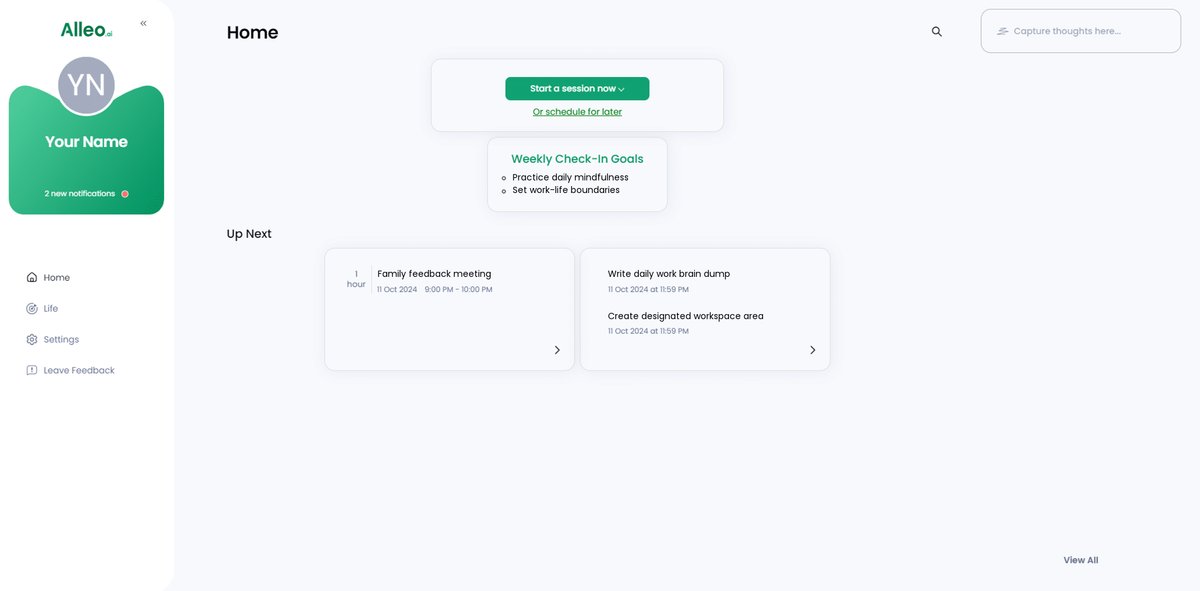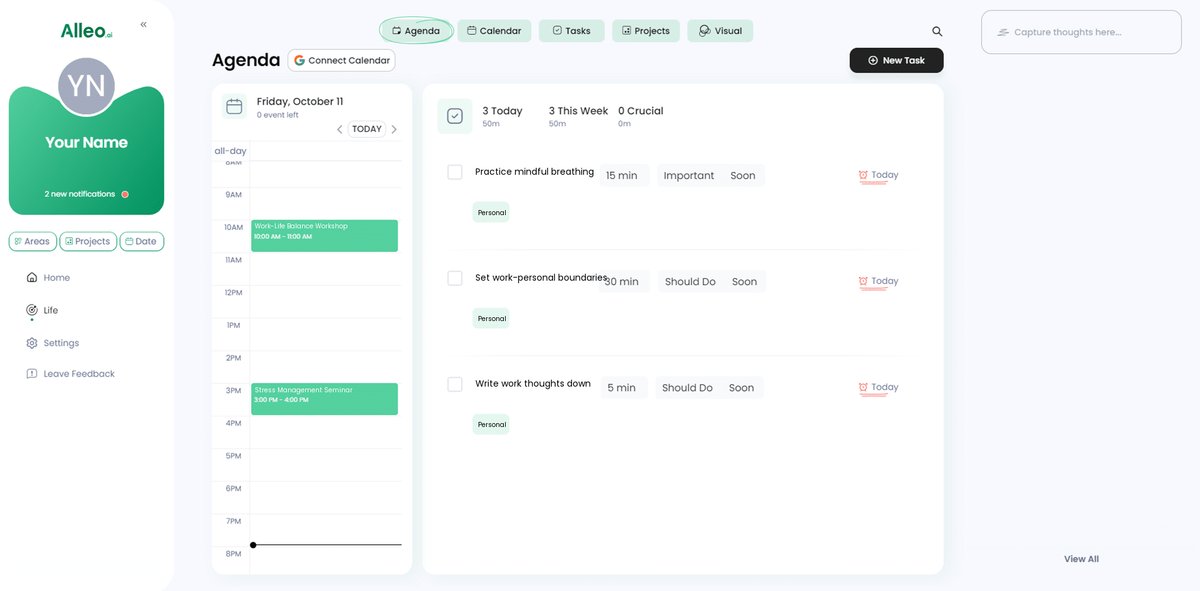6 Essential Ways Managers Can Stop Work Stress from Affecting Personal Life
Have you ever found yourself snapping at loved ones after a tough day at work, or feeling the need to argue over trivial issues even when you’re supposed to be managing work stress at home? These are common challenges in maintaining work-life balance.
As a life coach specializing in stress management for managers, I’ve helped many professionals navigate these challenges. I’ve seen firsthand how a work mindset can bleed into personal life, causing stress and conflicts, making it crucial to develop professional boundaries.
In this article, you’ll discover actionable strategies to separate your work mindset from personal life and reduce argumentativeness. We’ll cover mindfulness for managers, setting boundaries, relaxation techniques, and more to improve workplace communication skills and emotional intelligence in leadership.
Let’s dive in and explore effective ways of managing work stress at home and maintaining healthy coping mechanisms.

Why Work Stress Spills Over into Personal Life
It’s all too common for the stress and pressures from work to infiltrate our personal lives. Many clients initially struggle with managing work stress at home and maintaining a calm demeanor after a hectic day at work.
This can lead to unnecessary arguments and strained relationships, affecting work-life balance.
In my experience, people often find themselves arguing over trivial matters with loved ones. The frustration from unresolved work issues tends to bubble up during personal time, highlighting the need for conflict resolution techniques.
This not only disrupts family harmony but also perpetuates a cycle of stress, making stress management for managers crucial.
Several clients report feeling mentally exhausted and incapable of enjoying their personal time. This constant state of tension can damage relationships and impede personal well-being, emphasizing the importance of professional boundaries.
Addressing this issue is essential for a balanced life and requires emotional intelligence in leadership.
If you’re experiencing this, you’re not alone. The good news is that there are strategies to help manage this challenge effectively, including workplace communication skills and mindfulness for managers.

Steps to Overcome Argumentative Work Mindset
Overcoming this challenge requires a few key steps. Here are the main areas to focus on to make progress in managing work stress at home:
- Practice mindfulness to stay present in the moment: This helps you reset and refocus, improving your work-life balance.
- Set clear boundaries between work and personal time: Establish a strict cut-off time for work activities to maintain professional boundaries.
- Use “brain dump” to release work thoughts after hours: Write down lingering work thoughts to clear your mind and separate work and personal life.
- Engage in relaxation techniques before going home: Practice activities to transition from work to personal time, aiding in stress management for managers.
- Cultivate empathy to reduce argumentative tendencies: Engage in active listening and empathy-building exercises to enhance emotional intelligence in leadership.
- Seek feedback on communication style from family: Have regular family meetings for feedback and improvement of workplace communication skills.
Let’s dive in to explore these conflict resolution techniques and healthy coping mechanisms for managing workplace disagreements!
1: Practice mindfulness to stay present in the moment
Mindfulness helps you reset and refocus, keeping work stress from spilling into personal time, which is crucial for managing work stress at home.
Actionable Steps:
- Dedicate 10 minutes daily to mindfulness meditation. Use apps like Headspace or Calm to guide you in developing workplace communication skills.
- Practice mindful breathing exercises during work breaks to reset and refocus, enhancing your work-life balance.
- Engage in mindful activities like walking or eating without distractions to strengthen your ability to stay present and separate work and personal life.
Explanation: Practicing mindfulness can significantly reduce stress and improve your overall well-being, serving as a healthy coping mechanism.
These steps matter because they help you stay grounded, making it easier to separate work from personal life and maintain professional boundaries.
According to research, regular mindfulness practice enhances emotional regulation and reduces stress, which is crucial for maintaining a healthy work-life balance. For more information on the benefits of mindfulness, check out this resource.
Key benefits of mindfulness practice:
- Reduces stress and anxiety, aiding in managing work stress at home
- Improves focus and concentration, essential for stress management for managers
- Enhances emotional regulation, contributing to emotional intelligence in leadership
These steps will help you remain present and attentive in your personal life, preventing work stress from causing unnecessary conflicts and assisting in managing workplace disagreements.

2: Set clear boundaries between work and personal time
Setting clear boundaries between work and personal time is crucial to prevent work stress from spilling into your personal life when managing work stress at home.
Actionable Steps:
- Establish a strict cut-off time for work-related activities: Inform your team about your availability and stick to this cut-off time daily, demonstrating professional boundaries and workplace communication skills.
- Create a designated workspace at home: Physically separate your work area from your living space to help your mind distinguish between work and personal time, aiding in separating work and personal life.
- Use visual reminders to indicate the end of the workday: Set a timer or place a sign to signal the transition from work mode to personal time, supporting stress management for managers.
Explanation: Creating clear boundaries helps you mentally switch off from work, reducing stress and argumentativeness, which is essential for managing workplace disagreements.
This approach supports a healthier work-life balance, as emphasized by many studies on emotional intelligence in leadership.
For instance, a study highlighted on Behavioral Scientist discusses the importance of managing work-life balance to avoid burnout and improve overall well-being.
These steps will help you maintain harmony in your personal life, ensuring work stress does not lead to unnecessary conflicts, promoting healthy coping mechanisms when managing work stress at home.
3: Use “brain dump” to release work thoughts after hours
A brain dump helps clear your mind from work-related thoughts, reducing stress and improving focus on personal time. This technique is essential for managing work stress at home and maintaining work-life balance.
Actionable Steps:
- Write down lingering work thoughts for 10 minutes: Spend the last 10 minutes of your workday jotting down any unresolved tasks or concerns, an effective stress management for managers technique.
- Organize and prioritize these thoughts: Use a notebook or an app to categorize and rank these tasks by urgency for the next day, helping to establish professional boundaries.
- Share your list with a colleague: This keeps you accountable and ensures no important task is forgotten, improving workplace communication skills.
Explanation: These steps matter because they help you mentally disconnect from work, reducing stress and preventing arguments at home. They are crucial for managing work stress at home and separating work and personal life.
According to a study on Behavioral Scientist, managing work-life balance is crucial to avoid burnout and improve overall well-being.
Try these methods to keep work thoughts at bay and enjoy a more peaceful personal life. Implementing these strategies can enhance your emotional intelligence in leadership and provide healthy coping mechanisms for managing workplace disagreements.

4: Engage in relaxation techniques before going home
Engaging in relaxation techniques before going home can help you transition smoothly from work to personal time and is crucial for managing work stress at home.
Actionable Steps:
- Practice progressive muscle relaxation for 10 minutes: This technique involves tensing and relaxing each muscle group, reducing tension and stress, which is essential for work-life balance.
- Schedule a short walk or physical activity after work: A quick walk or light exercise can help clear your mind and shift your focus away from work, aiding in separating work and personal life.
- Listen to calming music or a favorite podcast during your commute: This helps to unwind and mentally prepare for personal time, promoting healthy coping mechanisms.
Explanation: These steps matter because they help you decompress and separate work stress from your personal life, which is crucial for maintaining professional boundaries.
Reducing stress before getting home ensures you’re more present and less argumentative with loved ones, improving workplace communication skills and emotional intelligence in leadership.
According to Immunize Nevada, effective stress management is crucial for maintaining mental health and productivity.
Benefits of relaxation techniques:
- Reduces physical tension
- Lowers stress hormones
- Improves mood and mental clarity
Trying these techniques can make the transition from work to home smoother and more enjoyable, supporting better stress management for managers and helping in managing workplace disagreements.
5: Cultivate empathy to reduce argumentative tendencies
Cultivating empathy is crucial for reducing argumentativeness and fostering healthier relationships, which is essential when managing work stress at home.
Actionable Steps:
- Engage in active listening exercises: Focus on understanding your family members’ perspectives by listening without interrupting, improving workplace communication skills in the process.
- Practice empathy-building activities: Volunteer or support a friend in need to develop a deeper understanding of others’ emotions, enhancing your emotional intelligence in leadership.
- Reflect on your own experiences: Consider how you felt in similar situations to better understand others’ feelings, aiding in stress management for managers.
Explanation: These steps matter because they help you connect more deeply with loved ones, reducing the likelihood of arguments and managing workplace disagreements.
According to research, empathy is vital for maintaining harmonious relationships and work-life balance. For more insights, visit this resource on empathy and feedback.
By implementing these strategies, you can improve your interactions, create a more peaceful home environment, and effectively manage work stress at home while maintaining professional boundaries.

6: Seek feedback on communication style from family
Seeking feedback on your communication style from family is essential to improving interactions and reducing argumentativeness, which can help in managing work stress at home.
Actionable Steps:
- Initiate regular family meetings: Schedule weekly family meetings to discuss communication styles, gather constructive feedback, and address work-life balance concerns.
- Use a feedback journal: Document and reflect on the feedback received from family members to track your progress, identify areas for improvement, and enhance your emotional intelligence in leadership.
- Implement one change based on feedback weekly: Choose one piece of feedback to act on each week and observe how it impacts your family dynamics and workplace communication skills.
Explanation: These steps matter because they help you become more aware of your communication habits and make necessary adjustments, which are crucial for managing workplace disagreements and maintaining professional boundaries.
Improving communication can reduce conflicts and enhance relationships. According to a resource on Radical Candor, understanding feedback is crucial to personal growth and effective relationships, including stress management for managers.
Key aspects of effective feedback:
- Be specific and actionable
- Focus on behavior, not personality
- Offer both positive and constructive feedback
Implementing these strategies will foster a more harmonious home environment, strengthen your family bonds, and help in managing work stress at home through healthy coping mechanisms and mindfulness for managers.

Partner with Alleo to Manage Work Stress
We’ve explored how work stress can affect your personal life and the steps to manage it. But did you know you can work with Alleo to make managing work stress at home easier?
Alleo offers tailored coaching for managing workplace disagreements and stress. Set up an account and create a personalized plan for improving your work-life balance.
Alleo’s AI coach will guide you through stress management techniques, mindfulness practices for managers, and setting professional boundaries.
Alleo’s coach will follow up on your progress and handle changes. You’ll receive accountability via text and push notifications to help you develop healthy coping mechanisms.
Ready to get started for free and enhance your workplace communication skills? Let me show you how!
Step 1: Log In or Create Your Account
To start managing your work stress with Alleo’s AI coach, log in to your existing account or create a new one to begin your journey towards a more balanced life.

Step 2: Choose “Improving overall well-being and life satisfaction”
Select “Improving overall well-being and life satisfaction” as your primary goal to address the work-life balance issues and reduce argumentativeness, aligning with the strategies discussed in the article for a more harmonious personal life.

Step 3: Selecting the life area you want to focus on
Choose the “Personal” life area in Alleo to address work-life balance and reduce argumentativeness at home, aligning with the strategies discussed for separating your work mindset from personal life.

Step 4: Starting a Coaching Session
Begin your journey with Alleo by scheduling an intake session, where you’ll discuss your work stress challenges and create a personalized plan to improve your work-life balance and reduce argumentativeness at home.

Step 5: Viewing and Managing Goals After the Session
After your coaching session, open the Alleo app and check your home page to view and manage the work-life balance goals you discussed, allowing you to easily track your progress and make adjustments as needed.

Step 6: Adding events to your calendar or app
Use Alleo’s calendar and task features to schedule and track your progress in implementing stress management techniques, such as mindfulness sessions, relaxation exercises, and family meetings, helping you maintain a healthy work-life balance and reduce argumentativeness.

Bringing It All Together for a Balanced Life
Understanding how work stress impacts your personal life is the first step in managing work stress at home. Implementing the strategies outlined can help you maintain work-life balance and develop healthy coping mechanisms.
Remember, small changes can make a big difference. Practice mindfulness for managers, set professional boundaries, and engage in relaxation techniques to improve your stress management skills.
Cultivating empathy and seeking feedback will improve your workplace communication skills and interactions. You can create a peaceful home environment by separating work and personal life effectively.
Alleo is here to support you in managing work stress at home. Our AI coach provides personalized guidance for improving emotional intelligence in leadership and managing workplace disagreements.
Take action today. Try Alleo for free and transform your work-life balance using proven conflict resolution techniques.
You deserve a stress-free personal life.